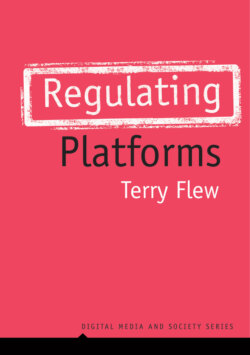Читать книгу Regulating Platforms - Terry Flew - Страница 16
Free Minds and Free Markets
ОглавлениеThere was a strong consensus in the early years of the internet that its development should be driven by a market-led model and that the role of the government should be minimized. The digital revolution, with its ‘crucial left-right fusion of free minds and free markets’, as Louis Rossetto (1966), the founding editor of WIRED magazine, described it, was a critical driver of thought and policy. This was so in spite of the fact that vital parts of the internet’s infrastructure – such as ARPANET – were largely funded by the US government, or that the World Wide Web was first developed by computer scientists at the government-funded Conseil Européen pour la Recherche Nucléaire (European Organization for Nuclear Research) (Castells, 2001; Mazzucato, 2015).
Beyond the level of pronouncements, such ideas had a substantive impact upon key areas of public policy. The Telecommunications Act 1996, which aimed to reduce legislative barriers to technological convergence, was passed by the US Congress in order to ‘promote competition and reduce regulation … and encourage the rapid deployment of new telecommunications technologies’ (Eisenach and May, 2001, p. 1). Upon signing the Act into law in 1996, President Bill Clinton proclaimed that it would ‘help to create an open marketplace where competition and innovation can move as quick as light’ (ibid.). In outlining the underlying principles behind the implementation of the Act, Reed Hundt, the chair of the Federal Communications Commission (FCC), pointed out that one of the commission’s core principles was to ‘make sure the discovered truth about competition is nowhere frustrated by the chronic urge to monopolize. Like a Hindu tale of the struggle between good and evil, the battle between competition and monopoly will last as long as markets exist. And government should always be on the good side: the side of competition’ (Hunt, quoted in Aufderheide, 1999, p. 283). His successor, William Kennard, would observe in 1998 that ‘the Act is all about competition’ (Kennard, quoted in Aufderheide, 1999, p. 301).
Extending these pro-competitive, deregulatory principles internationally, in 1998 the US government’s White Paper on internet governance proposed the creation of a new entity, whose function would be to manage internet domain name allocation: the Internet Corporation for Assigned Names and Numbers (ICANN). Observing that ‘the Internet succeeds in great measure because it is a decentralized system that encourages innovation and maximizes individual freedom’, the White Paper proposed that, ‘where possible, market mechanisms that support competition and consumer choice should drive the management of the Internet because they will lower costs, promote innovation, encourage diversity, and enhance user choice and satisfaction’ (1998 White Paper, quoted in Mathiason, 2009, p. 56).
